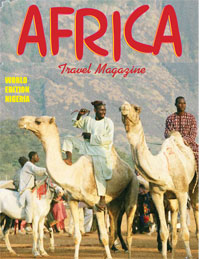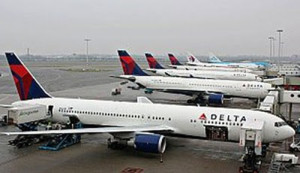|
|
|
|
|
|
|
|
|
|
|
|
|
|
Despite the progress being made by African airlines
in recent times, the continent is still dominated by
international carriers. Chinedu Eze writes that
governments’ unfavourable policies and inter nation
rivalries impede the growth of African carriers.
There are statistics that are irritating about air
transport in Africa. In spite of over one billion
population of the continent, it contributes only two
per cent of the world aviation market. It has the
highest air crashes in the world and foreign
carriers from other continents generate $10 billion
from the region, while its own airlines have a
market share of only 20 per cent from the continent.
When the number of aircraft owned by African
carriers are put together, they are less than the
fleet of some international airlines like Delta Air
Lines and over 98 per cent of African airlines are
at the verge of bankruptcy. The cost of operating
airlines in Africa is the highest in the world and
cost of aviation fuel in the continent is also the
highest in the world and this include countries that
are oil producing like Nigeria.
The major problems of air transport in Africa could
be described as self-inflicted. Countries in Africa
refused to liberalise their skies for free entry and
exit for African airlines. Policies enunciated and
implemented by African governments tend to be
anti-business and this affect profitability for
African airlines.
And there is always policy summersault in many
countries, whereby policies change as new aviation
ministers are appointed. Most policies are not
followed through but changed midway. Finally, there
is the attitude of Africans to stand against their
own, but open doors to foreign airlines, an attitude
that is attributed to colonial mentality.
Many of these were brought to the fore last week
when African aviation experts, top government
officials in aviation and international aviation
financiers and aircraft manufacturers met in Addis
Ababa at the African Aviation Summit and Air Finance
for Africa organised by the African Aviation
Services Limited.
Opening African Skies
According to World Bank report on air transport in
Africa, the continent is home to 12 per cent of the
world’s people, but it accounts for less than one
per cent of the global air service market.
Part of the reasons for Africa’s under-served
status, according to World Bank study, is that it
refused to open its skies by implementing the
Yamoussoukro Decision, which was adopted by African
states in 1988 aimed at libralising the continent’s
airspace, as many African countries restrict their
air services markets to protect the share held by
state-owned air carriers that were established in
the 1960s, many of which had gone under.
So World Bank report said liberalising air transport
in the continent would deliver improved safety,
lower fares and increase traffic in Africa.
The CEO of African Aviation Services Limited and
former Secretary General of African Airlines
Association (AFRAA), Nick Fadugba, said the African
Heads of State and Government approved the
Yamoussoukro Decision (YD) in 2000 as legally
binding instrument on all African Union member
states and according to the United Nations Economic
Commission for Africa (UNECA), the YD was intended
to create a conducive environment for the
development and provision of safe, reliable and
affordable air transport services in Africa.
Fadugba therefore called on the African States and
the African Union to launch African aviation
initiative that could move the continent forward.
“It is not acceptable for Africa to have only two
per cent of the world aviation market. Inter nation
rivalry should be discouraged. You will recall that
Yamoussoukro Decision was established in 1988, but
over 20 years later it is yet to be fully
implemented. We are in danger of being a laughing
stock to the rest of the world,” he said.
Fadugba said it was ironic that the main
beneficiaries of Africa’s recent air traffic growth
have been non-African airlines, adding that air
transport is critical to Africa’s economic
advancement and “I believe that African government
and African Union should take urgent steps to help
remove the hurdles that hinder the growth of
commercial airlines, as well as business and general
aviation operators.”
Discernible Growth
The CEO of the most successful and most profitable
airline in Africa, Ethiopia Airlines, Tewolde
Gebremariam, noted that in Africa the aviation
industry accounts for about $70 billion of the
continents GDP and supports seven million jobs.
“With Africa’s rise, these should have been exciting
times for African aviation. However, Africa’s bright
economic prospects are not being translated into
opportunities for the African airline industry. Far
from it! It is ironic that in the golden years of
Africa’s economic boom, our industry in Africa is
fighting for its very survival due to the very high
operating costs in the continent, uneven and
stifling foreign competition, infrastructure
challenges and traffic rights restriction.”
Poor Infrastructure
President and Chairman of the Board of Directors
African Export-Import Bank (Afreximbank), Mr.
Jean-Louis Ekra, said air transport in Africa is
beset with underdeveloped infrastructure such as
airport facilities and poorly equipped airlines.
He also observed that poor record of safety and
security as compared to international standards;
lack of effective enforcement of safety regulations
as well as absence of political will on the part of
some governments, especially in relation to the
implementation of the Yamoussoukro Decision are some
of the problems facing the growth of aviation in the
continent.
“As you are aware, the Yamoussoukro Decision is an
African Union instrument intended to liberalise
activity in the aviation sector and, in so doing,
improve efficiency and contribute in attracting
capital investment into the sector.”
He however remarked that there is ineffective
control and supervision of licensed institutions in
charge of delivery of Aviation services and there is
also lack of up-to-date systemic surveillance
structures, among others.
Growth
Although air transport in Africa has increased in
recent years and it was projected that at 6.1 per
cent, Africa would be the third fastest growing
regions in the world by 2015, but foreign carriers
would still dominate the region’s airspace.
Also the volume of African airline business is
expected to treble in the next 20 years from its
current level to about $200 billion.
It is further projected that the industry would grow
in terms of its impact on African economies in the
next 20 years and job creation is projected to be
around 879,000, but this would be dependent on how
African states cooperate to empower airlines in the
region through favourable policies and
liberalisation.
Mr Zemedeneh Negatu, Parter, Ernst & Young, Ethiopia
said if African airlines were prioritised to compete
globally they would be contributing 24 per cent to
Africa’s GDP, which is about $2 trillion annually.
Negative Perception
But he lamented that the perception of Africa as a
place to do business is negative and for the
continent to progress, this perception must be
changed, observing that global media are still very
negative about Africa.
Negatu therefore recommended that for African
airlines to succeed they must have to cooperate.
“The root cause of bankruptcy of African airlines is
bad governance through interferences, change of
policies. Ethiopia Airlines is 100 per cent state
owned but it is run like a business,” he said.
Some of the delegates that spoke at the summit noted
that for African airlines to cooperate, African
nations must show the desire that they wish to
relate with one another, adding that African
airlines should have one sky because it would be to
the benefit of all to do so.
Some of the problems of African airlines were
identified and these include market access. While
non-African airlines have easy access to the
continent, it is sometimes very difficult for
African airlines to have access to Europe and the
US.
Globally, competition is said to be uneven and it is
said that the African environment is costly in doing
air transport business.
Aviation as Strategic Sector
The CEO of Ethiopia Airlines, Gebremariam, said
aviation in Africa should be considered as a
strategic sector for the socio economic
transformation and integration of Africa.
“This means no more excessive taxation and fees
imposed on our industry. It also means no more
fragmented small markets of 55 African countries,
which will inevitably lead to a certain death of the
African aviation industry.”
Gebremariam said the creation of single African
aviation market should be a priority in African
Union Agenda 2063, adding that the continent should
be one market governed by continental rules with
supra national institutions to enforce these rules
and with an African external aviation policy when
dealing with third parties outside the continent.
“With Africa projected to be the next and perhaps
the last frontier in globalisation, we cannot let
our indigenous industry die in front of our eyes and
allow our continent to be a mere consumer base for
the global economy. This is what will surely happen
if we continue with business as usual,” he said.
The Nigerian situation epitomises the problem of air
transport in Africa. In Nigeria, airlines find it
difficult to survive because of the hostile
environment which includes high charges, high cost
of fuel and inimical policies. Policies are made at
the whims and caprices of the Minister of Aviation
or the government in power and could be changed
arbitrarily.
Nigeria can afford to sell fuel at prices lower than
the international benchmark, government can
facilitate single interest rate for long term loans
for Nigerian airlines and government can introduce
policies that soften aircraft manufacturers and
lessors who see Africa and Nigeria as a harsh
environment to do business and therefore heighten
insurance premium of aircraft and also raise the
cost of leasing aircraft. This could be achieved
through cooperation. |
|||||













